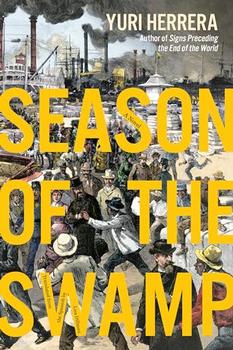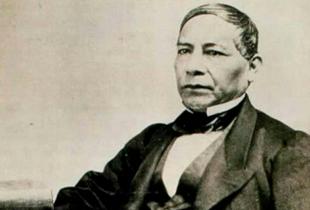Summary | Excerpt | Reviews | Beyond the book | Read-Alikes | Genres & Themes | Author Bio

A Novel
by Yuri HerreraA major new novel set in nineteenth-century New Orleans by the author of Signs Preceding the End of the World.
New Orleans, 1853. A young exile named Benito Juárez disembarks at a fetid port city at the edge of a swamp. Years later, he will become the first indigenous head of state in the postcolonial Americas, but now he is as anonymous and invisible as any other migrant to the roiling and alluring city of New Orleans.
Accompanied by a small group of fellow exiles who plot their return and hoped-for victory over the Mexican dictatorship, Juárez immerses himself in the city, which absorbs him like a sponge. He and his compatriots work odd jobs, suffer through the heat of a southern summer, fall victim to the cons and confusions of a strange young nation, succumb to the hallucinations of yellow fever, and fall in love with the music and food all around them. But unavoidable, too, is the grotesque traffic in human beings they witness as they try to shape their future.
Though the historical archive is silent about the eighteen months Juárez spent in New Orleans, Yuri Herrera imagines how Juárez's time there prepared him for what was to come. With the extraordinary linguistic play and love of popular forms that have characterized all of Herrera's fiction, Season of the Swamp is a magnificent work of speculative history, a love letter to the city of New Orleans and its polyglot culture, and a cautionary statement that informs our understanding of the world we live in.
Benito allows himself to be drawn into the chaos of New Orleans and the lives of the people he meets... A major theme of the novel is the failure or refusal to acknowledge the harm that one perpetrates; this is seen not only in Benito but in minor characters as well, such as the slave trader who insists that, as only the middleman, he is not responsible for the suffering he causes. As the book goes on, Benito repeatedly realizes that, despite his genuine empathy, he has missed the extent of people's suffering or misunderstood the nuances of their lives...continued
Full Review
 (690 words)
(690 words)
(Reviewed by Katharine Blatchford).
 In his novel Season of the Swamp, Yuri Herrera illuminates the year and a half Benito Juárez spent as a political exile in New Orleans, an often-overlooked period in the life of Mexico's first Indigenous president.
In his novel Season of the Swamp, Yuri Herrera illuminates the year and a half Benito Juárez spent as a political exile in New Orleans, an often-overlooked period in the life of Mexico's first Indigenous president.
Juárez was born in 1806 to a Zapotec family living in the town of San Pablo Guelatao, Oaxaca, Mexico. He was orphaned at a young age, after which he was raised by his uncle and attended a local seminary school. Later, he earned a law degree from the Institute of Arts and Sciences of Oaxaca, the first student from that school to do so. He entered politics by running for and winning a position on his municipal council as a member of the Liberal Party, which aimed to expand civil rights and religious freedom in ...

If you liked Season of the Swamp, try these:

by Allison Epstein
Published 2025
A thrilling reimagining of the world of Charles Dickens, as seen through the eyes of the infamous Jacob Fagin, London's most gifted pickpocket, liar, and rogue.

by Elizabeth Gonzalez James
Published 2025
A dazzling magical realism western in the vein of Cormac McCarthy meets Gabriel García Márquez, The Bullet Swallower follows a Mexican bandido as he sets off for Texas to save his family, only to encounter a mysterious figure who has come, finally, to collect a cosmic debt generations in the making.
When a true genius appears in the world, you may know him by this sign...
Click Here to find out who said this, as well as discovering other famous literary quotes!